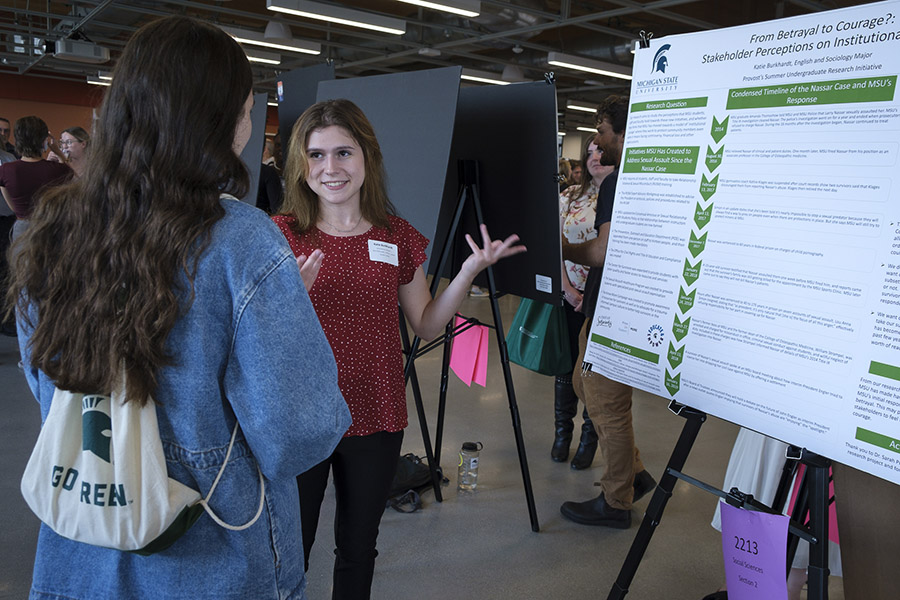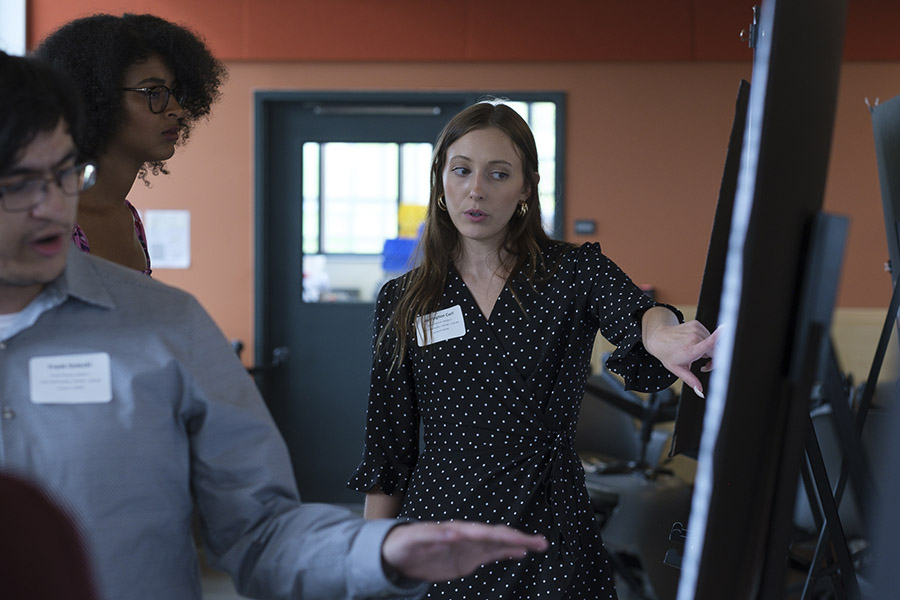SOC Undergrad shines at Mid-SURE Research presentations
August 7, 2022 - Emily Jodway

Sociology undergraduate Katie Burkhardt explains her research at the recent Mid-SURE symposium.
Each year, Mid-Michigan Symposium for Undergraduate Research Experiences (Mid-SURE) affords undergraduate students from across multiple academic disciplines the opportunity to share their research with both the University and the community at large.
From psychology to history, undergraduates from the College of Social Science showed off their recent research with poster presentations at Mid-SURE Wednesday afternoon. The event also included an online portion in the morning where students had the option to present their work over Zoom. The presentations gave a great example of the widespread and diverse types of research that happens within the College, from formula-driven studies on rhythmic ability in speech to questioning whether or not owning a pet was positively beneficial during the height of the COVID-19 pandemic.
The symposium includes Michigan State University students as well as undergraduates from more than 110 different institutions across the country. In some cases, Spartan students also had the chance to collaborate with students and faculty from these other areas. Each group of students worked closely with one or more mentors from a diverse level of expertise, such as MSU faculty, staff, post-doctoral fellows, graduate students and government or industry researchers.
This year’s symposium also held its own special place in Michigan State history as it was hosted for the first time at the new STEM Teaching and Learning Facility. Having opened just over a year ago on September 17, 2021, the STEM facility was built around the site of the old Shaw Lane Power Plant as a comprehensive space for students across all disciplines to study, take classes, and conduct lab research.
Katie Burkhardt, a sociology student, was examining a timeline of the Larry Nassar case, attempting to analyze the changes that have been implemented at Michigan State in its wake and the perception that those involved with the University hold towards those changes. Her hope is that through better discussion from a stakeholder point of view on improvements the University has been making, individuals can feel safer and more supported on campus.
“I think that they've made a lot of good changes, but that there should be more discussion about these [measures] with survivors,” Katie said. “I also think that there needs to be more awareness about what sexual violence means, and that no matter what, if consent wasn’t given, that is sexual violence. So a greater awareness would definitely be good, and less pressure to record [the incident] and more focus on actually supporting the survivor.”
“I'm a little bit disappointed that we're not quite done yet, but I figure that's what the rest of the year will be for,” she added. “But it's really nice to have this opportunity to present this work that we've been working on to everyone.”
 The general consensus of the day was that some nerves came along with presenting, especially in the case of students who haven’t done in-person presentations of their research since the COVID-19 restrictions were put in place, or at all. But the day also came with a large amount of pride among students who were finally able to showcase their work in front of an audience.
The general consensus of the day was that some nerves came along with presenting, especially in the case of students who haven’t done in-person presentations of their research since the COVID-19 restrictions were put in place, or at all. But the day also came with a large amount of pride among students who were finally able to showcase their work in front of an audience.
“Today is really exciting, because it’s the first time I’ve done a poster like this all on my own,” psychology student Jillian Lange commented. “I’m immensely connected to my research because I want to be a psychologist some day and treat people who have PTSD. So this cause is very close to me and I could see a measure like this becoming really important in the future.”
Jillian conducted a study on the effect of long-term romantic relationships on posttraumatic growth. Her argument is that relationships and the addition of extra care and support are especially important for those currently experiencing or going through the aftermath of a traumatic experience. To date, measures of post-traumatic growth hinge solely on the individual’s personal experience, but Jillian and her team sought out to introduce a new measure that can include both the individual and their partner in any posttraumatic growth.
Mid-SURE proved to be an important opportunity for undergraduate students to present impactful research that could potentially spur real change. Human Resources and Labor Relations student Kerrington Curl examined the role of social belonging in a student’s choice of major, specifically why some fields, such as those in STEM, are so low on representation of women. While she felt that her research could have continued with a study of even more MSU students, she looked forward to the future of her project.
“I had a lot of fun with this,” she said. “I think if I did go further with this [study], we could figure out why these underrepresented groups are more susceptible to these feelings, and we can potentially mitigate it and do what we can to help them feel empowered and comfortable in the field they want to study in.”
For more information on Mid-SURE’s annual symposium, click here.

